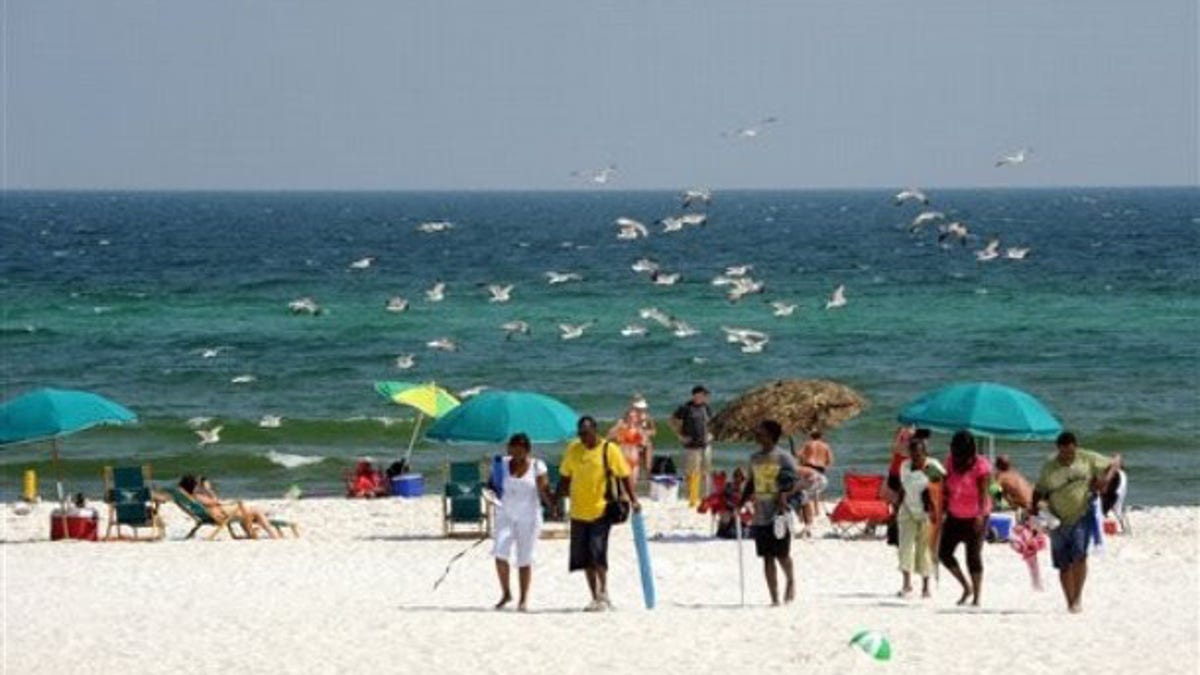
A day at the beach can lead to unexpected illness. (AP)
After your next trip to the beach, you may return home with something much more annoying than sand in your car.
Germs, bacteria and parasites that cause nasty infections and severe illnesses often lurk in sand and clear-blue water. Here are some of the top beach medical maladies you need to know and the precautions you can take before marking a spot with your umbrella and slathering on the sunscreen.
Food Poisoning
Eating spoiled or undercooked food at the beach could turn your beach picnic into a health scare. A bacterium called staphylococcus rapidly grows on mayonnaise, for example, that’s been left in the heat for too long. In an hour, this bacterium can attack your food and within four hours, it can cause severe vomiting and diarrhea, according to Dr. David A. Farcy, director of Emergency Department Critical Care at Mount Sinai Medical Center in Miami, Florida. To ensure your snacks and meals are safe, bring your food in a well-insulated cooler and pack plenty of ice. If a beach barbecue is in your plans, cook the meat longer than you would at home, especially if you like your meat on the pink side.
Unprotected Feet or Hands
You may think twice about not wearing sandals. Needles, pet waste and worms are just a few of the nasty things potentially hiding under your feet. Last year, public health officials scrambled to tackle a hookworm problem along a stretch of Miami Beach. Hookworm infection is spread via infected stray cats or dogs that use the sand to cover their feces. Dr. Farcy says the parasite can enter through unprotected skin, generally feet, and causes intense itching and possibly blisters several hours later.
It’s scary to think medical waste can turn up along our shores, but it’s happened. Your biggest concern with a needle prick would be hepatitis B. Dr. Farcy recommends if you are pricked with a needle, see a doctor who may recommend undergoing testing, and adds, “unfortunately there is no way to prevent hepatitis B after it happens.” To put your mind at ease concerning the risk of HIV, Dr. Farcy says the virus is too fragile, and the risk is near zero unless the needle was recently used and freshly discarded.
Sea Lice/Swimmer’s Itch
No one wants to come into contact with sharks, stingrays or jellyfish, but there may be a friendly encounter with a fish that brushes against you and leaves behind a parasite, causing severe itching in the bathing suit area. Many swimmers may rush to the nearest beach shower to rinse off, but Dr. Farcy says not so fast because that you may do more harm than good. “The fresh water will kill the parasite, causing them to release a toxin that will cause the itch to intensify,” says Dr. Farcy. The best bet is to remove your swimsuit (not in public) and wash with soap and water.
Contaminated Water or Sea Life
Swallowing water could cause more than a brief coughing fit. Large downpours of rain can cause sewage backups that end up in the ocean, causing an increased amount of E. Coli bacteria. If you swallow contaminated water, it could cause vomiting, nausea and diarrhea. Always adhere to the beach advisories that are put up to protect you. Local governments test water for contamination on a regular basis and post advisories warning swimmers to stay ashore. Last year, the number of beach closings and advisories reached 24,091, the second-highest level in 21 years, according to an annual survey by Natural Resources Defense Council.
Collecting sand or seashells at the seashore may be enjoyable, but did you ever think about what you are about to carry home? These beach trophies may look clean but it’s what you don’t see with the naked eye that could be a health risk. Dr. Farcy says shells, sand and sea life can carry insects, viruses, bacteria and even petroleum products that can cause you to become ill.
Viruses
“You have to treat kids at the beach the same as you would treat them at a daycare center,” says Dr. Farcy. Children love to share toys, food, sippy cups and even kisses, but behind those summer smiles may be a nasty virus waiting to spoil their fun. All of these beach necessities should be kept personal, and if children share, wash the items thoroughly with soap and water when you return home.
Sand Traps
Burying someone in sand may seem fun and harmless, but in fact, it can be deadly. Within minutes, sand pits can potentially turn into a beach coffin. “It can crush their chest to the point where they stop breathing,” says Dr. Farcy. In May, Jakub Maly, an Olympic swimmer from Austria was nearly crushed to death after he jumped into a sand pit at a beach in Pompano Beach, Florida. It took rescuers two hours to pull him from the sand’s grip. He was released from the hospital and returned home with the rest of his team.
Not all beaches are created equal, but the majority offer safe summer fun; before you head out on your excursion, know what health hazards you may be about to step on, swim into and pass along, so you don’t get trapped into a trip to the ER.
